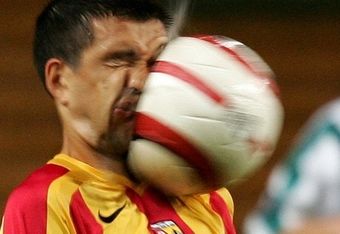 Now that I’ve laid out the metaphor and context of “A Team’s Last Line of Defense” in Part One, I want to point out that in a team setting there are always (or usually) one or two people that are the “goalkeepers” – they see when the values and vision are being compromised and they try to step in to keep things on track, guarding against decisions and processes that undermine core values. They see the big picture in a value and holistic sense and understand how various decisions influence other aspects of what the team’s going after. These people tend to keep us honest. Sometimes they function prophetically. Sometimes they just remind us what needs to be happening. But in what they do they provide reminders of the team’s value foundation and what is most important.
Now that I’ve laid out the metaphor and context of “A Team’s Last Line of Defense” in Part One, I want to point out that in a team setting there are always (or usually) one or two people that are the “goalkeepers” – they see when the values and vision are being compromised and they try to step in to keep things on track, guarding against decisions and processes that undermine core values. They see the big picture in a value and holistic sense and understand how various decisions influence other aspects of what the team’s going after. These people tend to keep us honest. Sometimes they function prophetically. Sometimes they just remind us what needs to be happening. But in what they do they provide reminders of the team’s value foundation and what is most important.
But the fewer people that are “doing their job” as Doc Rivers likes to say on a team, the more pressure is put on these individuals to speak up, challenge processes, or do damage control. Goals are allowed and with each one the trust and meaning that depends on the integrity of the team breaks down a little more.
Here’s one of my observations about teams – when job descriptions become the sole ground for accountability on teams, then over time the pressure to preserve the integrity of the team and the foundation of values falls increasingly to the instinctual team “goalkeepers” and if things don’t improve those people will grow disillusioned. Why I highlight the job description culture is that it nurtures a CYA environment (which stands for Cover Your bAckside in this family friendly blog).
We have to expand our view of “Doing Your Job” to the world of reinforcing values as opposed to just taking care of what you are supposed to be doing on paper. When people view “doing their job” as only extending to their own job descriptions, it creates massive cracks in the system that things can fall through that run against the foundation of values. Goals get allowed and nobody really learns or changes anything because they can point to their job description and say, “Hey, that’s not my job” or they can absolve themselves of guilt. Or decisions are made by other people outside of one’s own scope of responsibility, but they undermine the values that everyone has committed to. A failure to speak up in these moments or engage on the level of values can allow the overall integrity of the team to be undermined significantly.
CYA cultures end up discouraging the instinctive “goalkeepers” and likely send them elsewhere since after a while people understandably get tired of getting scored upon when there’s no hope of the defense getting any better.
So what am I proposing? Every member of the team needs to be first and foremost committed to the team values and a clear understanding of what’s most important in how things are done. Each person needs to be an advocate for the values and the overall culture you are trying to advance. They need to be perhaps even more committed to this than their own job description.
Every team member needs to embrace what it means to be the team’s “Last Line of Defense” against integrity breaches. If this doesn’t become part of the team and leadership culture, then you will lose the instinctive goalkeepers you do have and you will pay the price. Teams have to spend consistent time talking about values because that the internalization of those values dictates the group identity.
In case anyone thinks that my train of thought on this topic is nurturing a blame shifting or fault finding culture, what I would say is that such a critique is still fundamentally reflective of a job description mentality. It’s not about blame shifting – it’s about fighting for your values and preserving your integrity. Perhaps there is more accountability to go around, but the focus is positive – on advancing your values. Gracious accountability is possible. Blame shifting is toxic.
What do you think? Is it possible to nurture an environment where everyone sees their role as being the last line of defense against decisions, indecision, processes, and practices that undermine integrity and core values? How do you think this can be done in your context?
And finally, there’s a leadership metaphor here in this picture though I’m not yet sure what it is. Feel free to share your own interpretation 🙂

